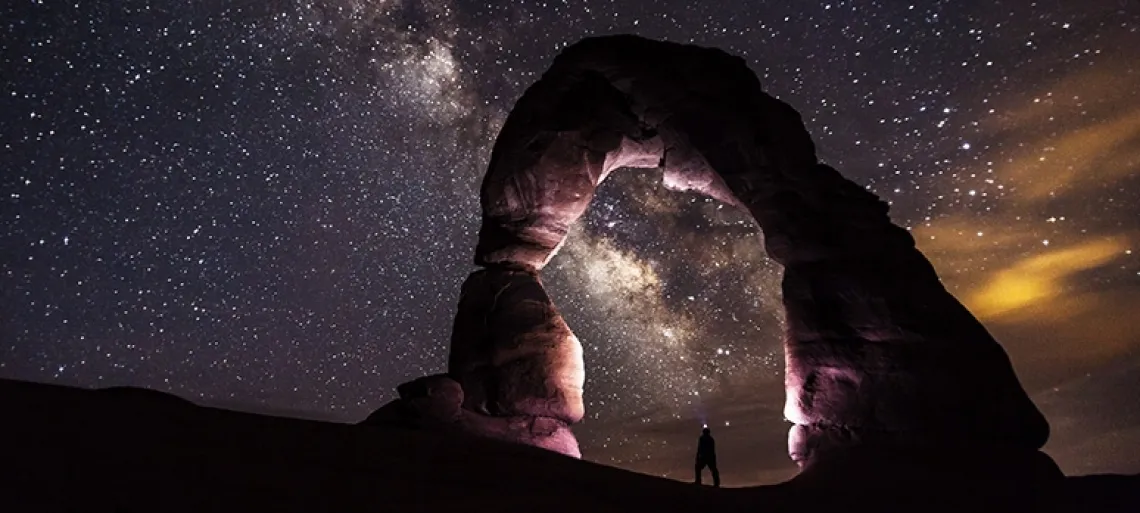‘Search the Darkness’ To Find a Path Through Uncertainty

For many University of Arizona employees, the idea of returning to campus this fall evokes shared feelings of uncertainty.
Ongoing, unpredictable crises can elicit extraordinary human responses. These creative expressions, in part, can communicate a direction forward through the tumult. Thirteenth century poet and Sufi mystic Rumi offers such a frame in his poem “Search the Darkness.” Lines from that work lead the following suggestions on how to find a path through the current confusion.
Search the darkness
These unprecedented times may leave many of us feeling like we’re treading on shifting sands. However, we can return to our center to reflect on occasions when we’ve met fear and discovered our own inner capability.
When we stop, breathe, and intentionally meet the moment – perhaps in quiet meditation, a silent walk in the neighborhood, or a journaling session – we make a powerful choice to be with reality.
As psychologist Tara Brach has advised, this choice to be with the emotions moving inside us helps us relate to fear. Relating to feelings, versus avoiding or controlling them, strengthens our ability to bounce back mentally and emotionally during a crisis.
If we practice this gentle art of keeping good company with ourselves, we connect to the power of our greatest calm within the body. Also, by taking this momentary step back, we can take stock of which activities have recharged us and schedule moments in our day to practice them.
Don’t run from it
Sometimes it is said, in support groups where individuals recovering from addictions meet, that we may find gratitude in “shared malady,” because difficult conditions can set us on a path to discover our true nature. How we face a crisis can impact how we respond to the situation and what we can learn about ourselves.
As Dr. Richard Carmona, director of the campus reentry task force, mentioned in a briefing, he saw parts of the reentry process as learning opportunities for the University’s students, shifting the perspective of the crisis to something we can grow from and face as a community. Those living in recovery employ the same shift of perspective: “We can.”
Perhaps we can follow these examples of resiliency to embrace difficulty together. We could see these uncertain times as an opportunity to awaken more fully to reality and not perpetuate our own suffering by trying to avoid it, deny it, or numb it.
Don’t leave this companionship
To help planetary scientists determine the composition of atmospheres of distant planets, hyperreflective mirrors are engineered at the University of Arizona’s own Richard F. Caris Mirror Laboratory. In much the same way, trustworthy relationships can be “honest mirrors” that reflect how our thoughts, behaviors, and emotions might be harmful to ourselves and others.
Seeing our circumstances clearly through someone else’s eyes opens us up to new possibilities of coping, especially if we’re unaware how our own perceptions are adding to our fear.
Most importantly, though, it fulfills our basic human longing for belonging. Receiving advice and care from supportive friends or family reduces worry and loneliness, too. This can help make a crisis more manageable.
In addition, by asking someone for help, we practice courage and humility. We don’t have to have all the answers.
Be a wakeful candle in a golden dish
Most emotional and mental states are temporary and shifting. Even if we achieve balance, that too can be transitory.
External sources for information, like social media platforms and hyperpartisan news, often share only a vague relationship with the truth. They leverage emotional contagion for “clicks” and seldom help clarify confusion and restore equilibrium.
By selecting more reliable information sources and using self-care practices to bring us back to center, we strengthen our ability to adapt and ride the waves of uncertainty.
As Rumi’s poem suggests, we are travelers in unpredictable times – but full of light if we choose to be. By consciously befriending and honoring our own feelings, we can discover our own resilience and make stable steps forward even on shifting sands.

